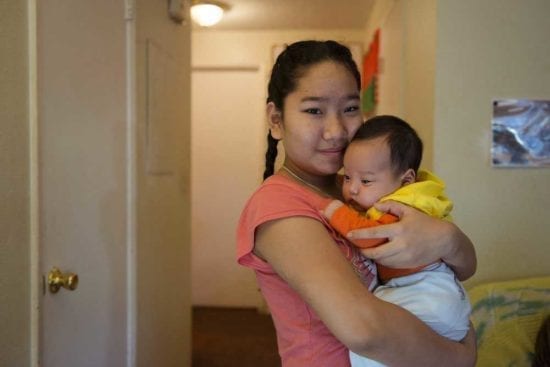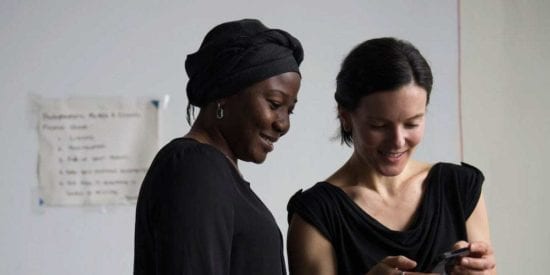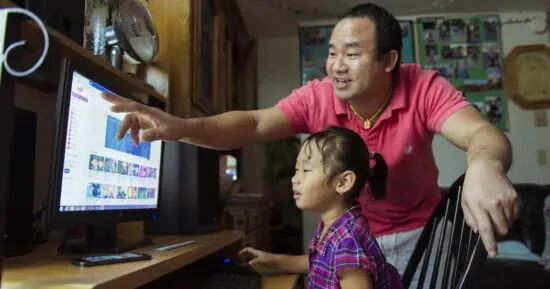Vai trò giới tính
Một trong những khác biệt lớn nhất về vai trò gia đình mà bạn có thể phải thích nghi ở USA là vai trò giới tính. Ở USA, phụ nữ thường làm việc bên ngoài nhà. Phụ nữ và đàn ông chia sẻ công việc nhà. Cả phụ nữ và đàn ông đều chăm sóc trẻ em. Đôi khi, đàn ông cảm thấy bực bội vì họ không quen dọn dẹp nhà cửa hoặc nấu bữa tối. Nhưng ở USA, việc giúp đỡ việc nhà và chăm sóc con cái được coi là một phần quan trọng của người đàn ông.
Vai trò gia đình của cha mẹ
Việc nuôi dạy con cái ở USA có thể rất khác so với ở quốc gia của bạn. Trẻ em tị nạn và nhập cư thường thích nghi với cuộc sống ở Hoa Kỳ nhanh hơn nhiều so với cha mẹ chúng. Họ thường học tiếng Anh nhanh hơn cha mẹ mình. Điều này có thể khó khăn đối với các bậc phụ huynh và con cái bạn, đặc biệt là khi bạn phải nhờ con cái giúp bạn di chuyển và phiên dịch.
Nhiều người Mỹ gửi con đến các trung tâm chăm sóc trẻ em. Điều này có nghĩa là họ đang bị ai đó ở bên ngoài nhà theo dõi. Đối với một số người tị nạn, đây là một tình huống rất kỳ lạ. Có thể bạn luôn có con cái ở nhà cùng hoặc có ông bà giúp chăm sóc chúng. Ở USA, nhiều người hàng xóm giúp đỡ nhau chia sẻ việc chăm sóc trẻ em. Nếu bạn sống gần những người tị nạn và người nhập cư khác, hãy cân nhắc đến việc nhờ họ chia sẻ việc chăm sóc trẻ em.
Newcomers đôi khi gặp khó khăn vì hành vi của con cái họ thay đổi so với khi còn ở quê nhà. Bạn có thể không thích một số hành vi mới của con và bạn sẽ cần tìm hiểu những cách nuôi dạy con mới ở USA. Tuy nhiên, mặc dù có thể khó khăn, bạn vẫn có thể truyền lại một phần văn hóa của mình cho con cái đồng thời giúp chúng thành công tại USA.
Lạm dụng trẻ em
Trẻ em ở Mỹ có luật bảo vệ trẻ em, điều đó có nghĩa là việc ngược đãi trẻ em là vi phạm pháp luật. Luật liên bang định nghĩa lạm dụng là bất kỳ hành vi nào gây tổn hại nghiêm trọng cho trẻ em hoặc gây nguy hiểm cho trẻ. Lạm dụng thể xác có nghĩa là bất kỳ hành động nào không phải do tai nạn và có thể từ vết bầm tím nhỏ đến chấn thương nghiêm trọng như gãy xương. Việc trẻ em bị thương là hành vi ngược đãi ngay cả khi cha mẹ không cố ý làm tổn thương trẻ. Kỷ luật về thể xác, chẳng hạn như đánh vào mông trẻ, được phép nhưng không được khuyến khích.
Bạn cũng không được phép ngược đãi tình cảm con mình. Lạm dụng tình cảm có thể ngăn cản trẻ phát triển toàn diện. Lạm dụng tình cảm có thể bao gồm việc liên tục chỉ trích, đe dọa hoặc từ chối, cũng như không yêu thương, hỗ trợ hoặc hướng dẫn.
Bỏ bê trẻ em
Bỏ bê trẻ em có nghĩa là cha mẹ không đáp ứng những nhu cầu cơ bản của con mình. Ở USA, bạn không được phép để trẻ nhỏ ở nhà một mình. Bạn cũng không được phép để trẻ nhỏ ở một mình xa nhà, ngay cả khi chúng ở trong xe đẩy, trên sân chơi, trong cửa hàng, văn phòng, thư viện hoặc trên ô tô. Trẻ nhỏ phải luôn được giám sát.
Hiện nay, ở nhiều tiểu bang, bỏ rơi được định nghĩa là một hình thức bỏ bê. Nhìn chung, một đứa trẻ được coi là bị bỏ rơi nếu đứa trẻ không biết cha mẹ mình ở đâu hoặc nếu đứa trẻ bị bỏ lại một mình và bị thương.
Vai trò gia đình của ông bà
Nhiều người mới đến lớn tuổi gặp khó khăn trong việc thích nghi với vai trò gia đình ở Hoa Kỳ. Ở nhiều quốc gia trên thế giới, người cao tuổi được đối xử rất tôn trọng. Trẻ em lắng nghe họ. Họ được coi là nguồn tri thức trong cộng đồng của họ.
Ở USA, nhiều người coi trọng tuổi trẻ hơn tuổi tác. Nhiều kiến thức mà người nhập cư lớn tuổi có được không còn phù hợp như ở quốc gia của họ. Ví dụ, một người tị nạn lớn tuổi có thể biết nhiều về nghề nông hoặc chăn nuôi bò nhưng ở Mỹ, các thành viên trong gia đình ông lại làm việc trong các tòa nhà văn phòng.
Đôi khi, những người tị nạn và người nhập cư lớn tuổi bắt đầu cảm thấy vô dụng. Nhưng việc chia sẻ văn hóa và giữ cho gia đình bạn gắn bó với đất nước là một công việc rất quan trọng đối với bạn. Ngoài ra, hãy nhớ rằng mặc dù trẻ em có thể cư xử khác đi ở ngôi nhà mới, chúng vẫn có thể yêu quý bạn.
Ngoài ra, còn có một số tổ chức rất tốt trên khắp đất nước hỗ trợ người tị nạn lớn tuổi. Bạn có thể tìm thông tin dành cho trường Trung cấp và cách tìm trung tâm dành cho người cao tuổi.
Thông tin về tình trạng lạm dụng và bỏ bê trẻ em trên trang này được lấy từ Cục Trẻ em của Chính phủ Hoa Kỳ và các nguồn đáng tin cậy khác. Tài liệu này mang tính chất hướng dẫn và sẽ được cập nhật thường xuyên nhất có thể. USAHello không đưa ra lời khuyên pháp lý và không có tài liệu nào của chúng tôi được coi là lời khuyên pháp lý. Nếu bạn đang tìm kiếm luật sư hoặc sự trợ giúp pháp lý miễn phí hoặc giá rẻ, chúng tôi có thể giúp bạn tìm các dịch vụ pháp lý miễn phí và giá rẻ.
Các tài liệu khác
Chúng tôi mong muốn cung cấp thông tin dễ hiểu được cập nhật thường xuyên. Thông tin này không phải là lời khuyên pháp lý.


